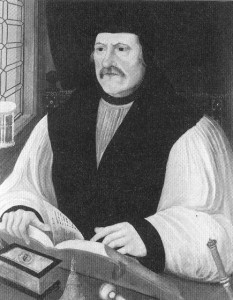 On 6th August 1504, Matthew Parker, chaplain to Anne Boleyn and Archbishop of Canterbury in her daughter’s reign, was born in the parish of St Saviour, Norwich. Parker was the son of worsted weaver William Parker and his wife Alice Monings [Monins] from Kent.
On 6th August 1504, Matthew Parker, chaplain to Anne Boleyn and Archbishop of Canterbury in her daughter’s reign, was born in the parish of St Saviour, Norwich. Parker was the son of worsted weaver William Parker and his wife Alice Monings [Monins] from Kent.
Parker was educated at Corpus Christi College in Cambridge, where he became friends with a group of reformers. He was appointed chaplain to Henry VIII in 1537 and also served as Anne Boleyn’s chaplain. It was Anne’s patronage which led to him being appointed dean of the collegiate church of Stoke by Clare in Suffolk.
On the 26th April 1536, Anne Boleyn asked Parker to watch over her daughter Elizabeth if anything should happen to Anne. On the 19th May 1536, just under a month after Anne had spoken to Parker, Anne was executed. Parker kept his word and he was rewarded for his loyalty by Elizabeth I in 1559 when she appointed him as her Archbishop of Canterbury. Parker had been offered the post in 1558 and had been reluctant; it was a post he did not believe that he was right for or fit enough for (he’d had a nasty fall from a horse). Parker wrote to Sir Nicholas Bacon:
“though my heart would right fain serve my sovereign lady the Queen’s majesty, in more respects than of mine allegiance, not forgetting what words her grace’s mother said to me of her, not six days before her apprehension, yet this my painful infirmity will not suffer it in all manner servings…”
In 1572, in a letter to William Cecil, Lord Burghley, Parker wrote of how he had only accepted the position of Archbishop of Canterbury because of his promise to Anne Boleyn:
“Yea, if I had not been so much bound to the mother, I would not so soon have granted to serve the daughter in this place…”
As Eric Ives wrote, “That charge, and the debt he felt he owed to Anne, stayed with him for the rest of his life.” It was enough of a promise for him to take a job that he didn’t really want or feel right for.
Matthew Parker is also known for being one of the men responsible for the Thirty-Nine Articles of Religion which were established in 1563 and which are seen as “the historic defining statements of Anglican doctrine in relation to the controversies of the English Reformation”. Matthew Parker died on the 17 May 1575.
Notes and Sources
- Parker, Matthew The Correspondence of Matthew Parker, D.D., Archbishop of Canterbury: Comprising Letters Written by and to Him, from A.D. 1535, to His Death, A.D. 1575 (edited for the Parker Society by John Bruce, and Thomas Thomason Perowne, 1853), p59 and 391
- Ives, Eric (2004) The Life and Death of Anne Boleyn, Blackwell Publishing, p267
- Article on the Thirty-Nine Articles